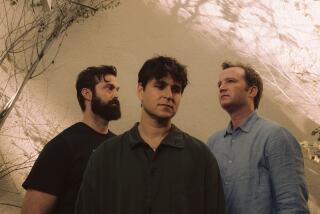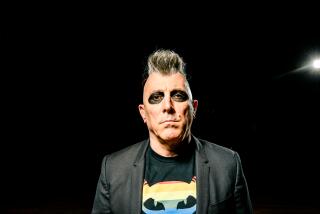From Tool, a Relentless Blending of Rock Genres
- Share via
The music of Tool is not about escape, but confrontation--a thundering exploration of dementia and decay. It is loud, brooding, richly orchestrated noise, out to uncover emotional layers of increasing intensity. This isn’t supposed to feel good.
That doesn’t mean it feels bad. During a relentless two-hour performance at the Wiltern Theatre on Monday, the Los Angeles band brought together the disparate elements of metal, punk, Goth and so-called “progressive” rock into something that was as much about release as anxiety.
The subtleties were sometimes buried beneath the volume and rage, but there was depth to Tool’s aggressively insular world. And it was frequently less about the lyrics than the tightly wound delivery of singer Maynard James Keenan.
It could be heard in his desperate mantra--”I know the pieces fit! I know the pieces fit!”--from “Schism,” which included a middle instrumental passage by guitarist Adam Jones that was raw, elegant and deeply musical. The group’s weakness for prog-rock flavors emerged on the stretched-out “Stinkfist,” a rock radio hit with epic vocal moments that suggested a new name for the band: Jethro Tool.
Keenan’s other successful band, the similarly dark and worthwhile A Perfect Circle, is a younger hard-rock act, with a sound and persona not yet fully realized. By contrast, Tool was a seamless, diamond-hard force, as polished at the Wiltern as on its new “Lateralus” album.
The record is not a massive step forward in the band’s overall sound, despite a wait of five years since 1996’s “Aenima.” It merely offers a deepening refinement of Tool’s obsessively raw ingredients, contributing far more ideas to the hard-rock genre in recent years than the self-congratulatory likes of Metallica. Like Nine Inch Nails, Tool first fused the once-warring factions of metal and punk in the ‘90s, inspiring a new generation of players.
Like the rest of the band, Keenan stood in the shadows on Monday (the first of two nights at the Wiltern), speaking only occasionally to the crowd, urging fans to persevere against “liars and thieves,” to absorb the evening’s good vibes and “take it home and create something positive.”
He performed mostly in profile, often turning away from the audience to face the big video screens behind him, stomping and shuddering to the beats as if drawing inspiration from the projected images.
Typically obtuse and chilling, they depicted various states of decay, and were key to Tool’s live presentation, illustrating Tool’s grim notion that humans and larvae are equals.
Tool’s dark rhythms were almost like ear candy compared to the thundering, uncompromising instrumentals of opening act King Crimson, whose prog-rock pioneering is a clear influence on the Tool sound.
Led by experimental guitarist Robert Fripp, the veteran band could be difficult or direct, plodding or soaring. It was at its best finding a stormy musical urgency that shared little with the brand of rock music heard on commercial radio.
While the lead playing of guitarist Adrian Belew was a more aggressive presence, even drifting toward Black Sabbath-like riffing, Fripp’s strange, clipped patterns were more unsettling. There were few vocals, though songs from the band’s early years were recognizably tuneful.
More to Read
The biggest entertainment stories
Get our big stories about Hollywood, film, television, music, arts, culture and more right in your inbox as soon as they publish.
You may occasionally receive promotional content from the Los Angeles Times.











